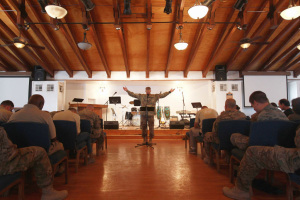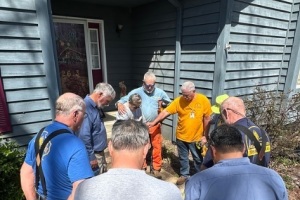Are Church of England parishes dropping use of the word 'church'?
CofE says rebranding claim is 'complete nonsense'

The Church of England is pushing back on a report suggesting that dioceses are increasingly refraining from using the word “church” to describe new congregations and faith communities popping up.
The Centre for Church Planting and Theology Research, which describes itself as an organization that “exists to provide the church with quality theological reflection on the activity of starting new churches, for the benefit of the whole church,” released a report titled “New Things: A theological investigation into the work of starting new churches across 11 dioceses in the Church of England.” The findings in the report are based on research conducted between November 2022 and June 2023 in 11 of the CofE’s 42 dioceses.
The research conducted for the report consisted of interviews with representatives of each diocese following their completion of a questionnaire. Based on the information gathered from the questionnaires and interviews, the Centre for Church Planting and Theology Research discovered that “all 11 dioceses had started new things within the last 10 years, with around 900 new things (on the dioceses’ own terms) started.”
The report adds: “89% of these are integrated within the existing parish system rather than existing as stand-alone churches. Anecdotally, these new things were seen to be growing in perceived contrast to most inherited churches. This includes 40 new resource churches (brand new churches and churches becoming resource centers).”
The report further noted that “new language” has emerged in the CofE that involves abandoning the use of the word “church” in favor of terms like “community” and “congregation.”
According to the research, “Not one diocese used the term church in their ‘main descriptor.’” Instead, the report stated, “Almost all of the dioceses had chosen a descriptor that allowed for breadth in ecclesial form.”
The term “worship” was used in the main descriptor for new faith communities in six of the 11 dioceses examined, while two used “congregation” and seven used the term “community.” The report suggested that the word “‘Church’ feels immediately restrictive and limiting” because “it seems [too] wedded to a particular form — whatever the size — and this form is likewise unobtainable for many of the things started.”
“There is a lack of uniformity in our ecclesial descriptors,” the report added. “This both in terms used, and in the justification, explanation, and parameters of these. In this sense, each diocese is working with a unique ecclesiology; a way of addressing the question: ‘what is a church?’ Some of the differences were stark. Especially when it comes to the issue of traditional ecclesial forms (worship, sacraments, etc.), with some dioceses recognizing these as central, and others less so.”
Still, the document stressed that “a lack of uniformity does not mean a lack of precision or care.” The embrace of terms other than “church” to describe places of worship is seen as reflective of a move away from the traditional understanding of what constitutes a church.
A spokesperson for the CofE released a statement to Premier Christian News describing the idea that “the Church of England has plans to drop the word ‘church’ or that it is rebranding itself” as “complete nonsense.”
The denomination sought to clarify that the report looks at “new initiatives mostly created by parish churches — ranging from new youth groups or sport outreaches, right up to new congregations, with some of these not meeting in a church building — and noted that they do not always refer to what is happening as new churches but are using a variety of terms.”
Noting that “some people have claimed this means the Church of England has plans to drop the word ‘church’ or is rebranding itself,” the spokesperson insisted that “It does not.”
While the report acknowledged uncertainty regarding “whether it is possible to hold together the [Anglican denomination] if the local churches differ in their fundamental self-understanding,” it concluded that the “lack of uniformity” did not result in dioceses engaging in practices that do not “derive from the [CofE’s] own tradition and forms.”
The report cited the embrace of new terms for churches as part of an effort to make the CofE “a church where mixed ecology is the norm — where every person in England has access to an enriching and compelling community of faith by adding new churches and new forms of Church to our parishes, cathedrals, schools and chaplaincies.”
As part of its vision strategy for the 2020s, the CofE hopes to start more than 10,000 new worshiping communities throughout the decade. While 900 such communities were established over the past decade, as recorded in the report, not all of them survived.
Representatives from eight of the 11 dioceses studied reported that some of the new churches launched during this time “now do not exist,” due to the COVID-19 pandemic lockdowns that worsened already declining attendance as the primary reason why many churches had shut down.
The report did not highlight exactly how many newly formed congregations were closed in each diocese, only noting that one diocese saw 15 of 44 “new things” shut down as did seven of the 40 new worship communities formed in another.
New worship communities formed in the CofE faced other challenges as well, specifically difficulty appointing leaders, divergence between the diocesan vision and the vision of leaders of the individual congregation and finding meeting places.
Ryan Foley is a reporter for The Christian Post. He can be reached at: ryan.foley@christianpost.com





























